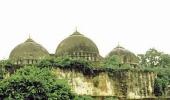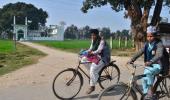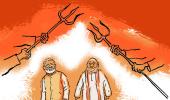'The idea is to have a place where people can come together and bridge the gap. It will be a contemporary design for the future, and not have the shadows of the past.'
Ritwik Sharma reports.

As members of the trust tasked with building a mosque to replace the Babri Masjid in Ayodhya deliberated in virtual meetings during the lockdown months, the exigencies of public health in a post-Covid world weren’t lost on them.
“With so much news focused on the global medical emergency and shortage of beds, we unanimously felt that we would be having a charitable hospital at least in the mosque complex,” says Athar Hussain, secretary of the Indo-Islamic Cultural Foundation, the trust set up by the Uttar Pradesh Sunni Central Waqf Board.
Recently, the trust picked S M Akhtar, an architecture professor at Jamia Millia Islamia in New Delhi, to design the mosque, which will be built in Dhannipur, a village 25 km from where the Babri Masjid stood.
The Uttar Pradesh government had offered five acres after the Supreme Court of India ordered a mosque to be built at an alternative site in its final word on the Ram Janambhoomi-Babri Masjid title dispute last November.
In the Muslim-majority village of Dhannipur, and in the city of Ayodhya, the minority community, particularly its youth, had long desired an end to the communal politics around the Babri Masjid and wished to move on.
Amid the acres of government-owned farmland in Dhannipur, off the Lucknow-Gorakhpur highway, the offered plot gives ample space for other facilities besides a shrine.
Hussain says Muslims in Ayodhya have aspirations, and promises the mosque complex would reflect the future.
That, however, cannot be done without peeping into the past.
“The best way to look into the past is to highlight our shared legacy of Indo-Islamic culture,” he says, and laments that the syncretic history has been pushed aside.
The trust has planned to set up an Indo-Islamic cultural research centre that will highlight the shared legacy of nearly a millennium to showcase the Muslim influence on Indian society.
It wants to publish material to bring out this aspect.
The trust has appointed Pushpesh Pant, who retired as professor of international relations from Jawaharlal Nehru University, as the curator of a proposed museum and library.
The museum and library will be part of the research centre, and will focus on the heritage of Awadh -- a historic region now part of north-eastern Uttar Pradesh.
“It is now forgotten that the last Mughal emperor, Bahadur Shah Zafar, was a titular head, but North Indian rajas and nobility chose him as a regent and fought under him against the colonial rule in 1857,” Hussain says. “Similarly, post-1857, prominent Muslim theological schools that came up in Awadh, including in Lucknow and Bareilly, sided with the Congress during the freedom struggle.”
Lastly, a community kitchen has also been proposed as a part of the mosque complex.
In the long-drawn-out title dispute, the Muslim parties involved hadn't sought alternative land.
Some within the community had wished for a replacement mosque to be built not too far from the disputed site after the Supreme Court ruled in favour of a Ram temple there.
The argument is based on a functional reason -- a mosque is essentially for worshippers of a particular area.
Regardless of the fact that the new mosque would be far from the city, Hussain says that there is no question of discontent among Muslims.
“Each and every Muslim, including litigants, had already agreed to abide by the decision," he said.
The practice of naming a mosque, or popularly referring to it based on its location, could well apply to the upcoming one in Dhannipur.
Hussain categorically says that the mosque will have no association with Babur or any other emperor.
The vision of a secular space, and one that isn’t overtly religious, is echoed by Akhtar.
“The idea is to have a place where people can come together and bridge the gap. It will be a contemporary design for the future, and not have the shadows of the past. I believe architecture cannot be replicated. It can only be created,” he says.













 © 2025
© 2025